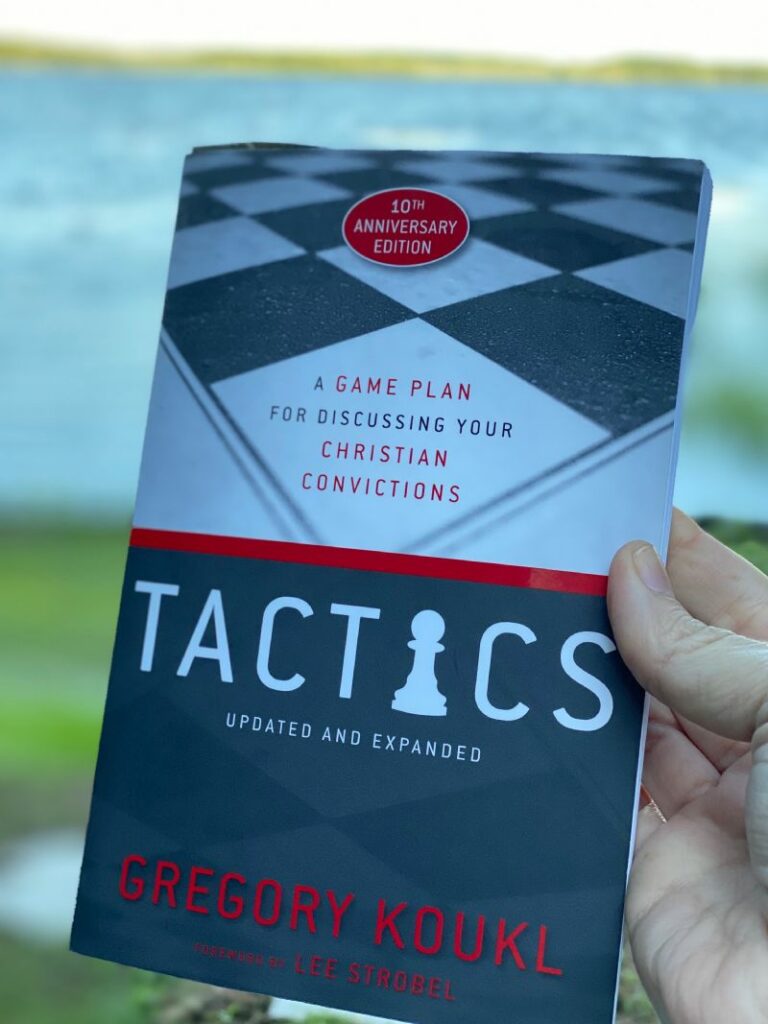“Tactics” is a book on how to have a conversation
with someone about Christian convictions.

Here is one example of a convo he had with a woman of how you can use questions to draw out someone’s faulty conclusions on things that matter.
He tells the story of a witch he met in Wisconsin who said she respected all life.
Greg:If you respect all life then I suppose you’re pro-life on the abortion issue.”
Witch: No, actually I’m not, I’m pro-choice.
Greg: Isn’t that an unusual position for someone in Wicca to take-I mean, since you’re committed to respecting all life?
She concluded that she couldn’t kill a baby.
By her own admission abortion was killing a baby.
Greg: Shouldn’t we do something to stop them from killing babies?
Witch: I think women should have a choice.
Greg: Do you mean women should have the choice to kill their own babies?
Witch: I think all things should be taken into consideration on this question.
Greg: Okay well tell me what kind of considerations would make it alright to kill a baby?
Witch: Incest
Greg: Let’s just say I had a two year old child standing beside me who have been conceived as a result of incest. On your view it seems I should have liberty to kill her. Is that right?
Witch: I’d have mixed feelings about that.
Greg’s goal in having convos where he challenges people’s belief’s systems is called “Putting a stone in someone’s shoe.” Like give them enough to be uncomfortable with their conclusions by asking questions related to their line of thinking.
You can read my blog called “Fight Phobic” for one portion I loved and could relate to completely in recent convos I have been having addressing false teaching.
When someone make a claim like “More wars have been fought and more blood has been shed in the name of God than for any other cause.”
You can use the Columbo tactic very simply in asking “What do you mean by that? & let the burden of proof fall on the the one making the claim. Ask “How did you come to that conclusion?”
In responding to them, you could ask the questions above and allow for the burden of proof to be on them. However, if they are used to saying this statement without being questioned, they may not have the answer.
That is when you could come prepared with the facts.
For instance “Out of the 1,763 wars that have been chronicled over the last five millennia, only 123 or 7% were motivated by religion. And religion paid no part in the two greatest military conflagrations in history-World War 1, with 16.5 million dead and World War II with 60-80 million perishing.”
If you have felt intimidated on how to face objections to our faith, this is the book for you. Greg admits he is not an evangelist, so where I might press in a little more directly as an evangelist, he is totally content with at least people realizing the faulty thinking they may possess by asking questions. We all have our part and I believe the tactics in this book could be used by the whole spectrum of Christianity to help us dialogue more effectively with the world and each other as Christians.
Here is Greg talking with Alisa Childers on her podcast about how to address Progressive Christians using “Tactics.”







